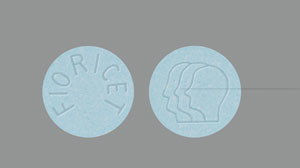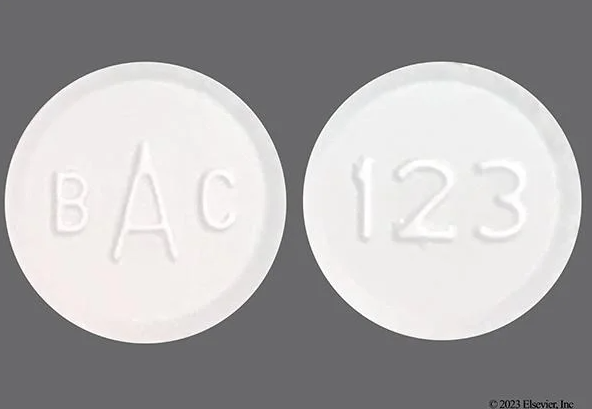Fioricet and Esgic are brand names of a combination of butalbital (a barbiturate), acetaminophen and caffeine which is indicated for the treatment of tension headaches,muscle contraction headaches and post-dural puncture headaches. Although not indicated, they are commonly used to treat migraines and other pain related ailments.

This combination medication is used to treat tension headaches. Acetaminophen helps to decrease the pain from the headache. Caffeinehelps increase the effects of acetaminophen. Butalbital is a sedative that helps to decrease anxiety and cause sleepiness and relaxation.
Fioricet is indicated for the treatment of muscle tension or muscle contraction headaches. It is also commonly prescribed for migraines although it is not FDA indicated for this use in the United States. The usual adult dose is 1-2 tablets every four hours as needed, not exceeding six tablets in a 24-hour period
Mechanism of action
 Butalbital has generalized depressant effect on central nervous system and, in very high doses, has peripheral effects. Acetaminophen has analgesic and antipyretic effects mediated by a metabolite which acts atcannabinoid receptors, contrary to popular belief it is not an antiinflammatory at safe levels (it becomes toxic at doses above 1,000mg per dose and/or 3,000mg per day). Caffeine is thought to produce constriction of cerebral blood vessels and serves to counteract the sedative effect of butalbital.
Butalbital has generalized depressant effect on central nervous system and, in very high doses, has peripheral effects. Acetaminophen has analgesic and antipyretic effects mediated by a metabolite which acts atcannabinoid receptors, contrary to popular belief it is not an antiinflammatory at safe levels (it becomes toxic at doses above 1,000mg per dose and/or 3,000mg per day). Caffeine is thought to produce constriction of cerebral blood vessels and serves to counteract the sedative effect of butalbital.
Butalbital has a half-life of about 35 hours. Acetaminophen has a half-life of about 1.25 to 3 hours, but may be increased by liver damage and after an overdose. Caffeine has a half-life of about 5 to 7 hours.
Common and Rare Fioricet Side Effects
Along with its needed effects, a medicine may cause some unwanted effects. Although not all of these side effects may occur, if they do occur they may need medical attention.
Check with your doctor immediately if any of the following side effects occur:
More common
Lightheadedness
shortness of breath
Incidence not known
Abdominal or stomach pain
black, tarry stools
bleeding gums
blistering, peeling, or loosening of the skin
blood in the urine or stools
blurred vision
change in the frequency of urination or amount of urine
chills
cough
diarrhea
difficulty with breathing
difficulty with swallowing
dizziness
drowsiness
dry mouth
fainting
fast, pounding, or irregular heartbeat or pulse
flushed or dry skin
fruit-like breath odor
hives, itching, or skin rash
increased hunger
increased thirst
increased urination
joint or muscle pain
loss of appetite
nausea or vomiting
pinpoint red spots on the skin
puffiness or swelling of the eyelids or around the eyes, face, lips, or tongue
red skin lesions, often with a purple center
red, irritated eyes
seizures
shakiness in the legs, arms, hands, or feet
sore throat
sores, ulcers, or white spots in the mouth or on the lips
sweating
swelling of the feet or lower legs
tightness in the chest
trembling or shaking of the hands or feet
troubled breathing
unexplained weight loss
unusual bleeding or bruising
unusual tiredness or weakness
weakness
Get emergency help immediately if any of the following symptoms of overdose occur:
Symptoms of overdose
Confusion as to time, place, or person
dark urine
difficult or painful urination
dizziness, faintness, or lightheadedness when getting up suddenly from a lying or sitting position
fever
general feeling of discomfort or illness
hallucinations
headache
holding false beliefs that cannot be changed by fact
increased sweating
irregular, fast or slow, or shallow breathing
light-colored stools
loss of appetite
pale or blue lips, fingernails, or skin
restlessness
sudden decrease in the amount of urine
sweating
trouble sleeping
unpleasant breath odor
unusual excitement, nervousness, or restlessness
vomiting of blood
yellow eyes or skin
Some side effects may occur that usually do not need medical attention. These side effects may go away during treatment as your body adjusts to the medicine. Also, your health care professional may be able to tell you about ways to prevent or reduce some of these side effects. Check with your health care professional if any of the following side effects continue or are bothersome or if you have any questions about them:
More common
Relaxed and calm
sleepiness
Incidence not known
Anxiety
bloated
constipation
continuing ringing or buzzing or other unexplained noise in the ears
depression
earache
excess air or gas in the stomach or intestines
false or unusual sense of well-being
full feeling
hearing loss
heartburn
heavy eyelids
high energy
hot spells
hyperventilation
irritability
numbness
pain in the leg
passing gas
sluggishness
stuffy nose
tingling sensation
Other side effects not listed may also occur in some patients. If you notice any other effects, check with your healthcare professional.
Call your doctor for medical advice about side effects. You may report side effects to the FDA at 1-800-FDA-1088.
What should I watch for?
Tell your doctor or health care professional if your pain does not go away, if it gets worse, or if you have new or a different type of pain. You may develop tolerance to the medicine. Tolerance means that you will need a higher dose of the medicine for pain relief. Tolerance is normal and is expected if you take the medicine for a long time.
Do not suddenly stop taking your medicine because you may develop a severe reaction. Your body becomes used to the medicine. This does NOT mean you are addicted. Addiction is a behavior related to getting and using a drug for a non-medical reason. If you have pain, you have a medical reason to take pain medicine. Your doctor will tell you how much medicine to take. If your doctor wants you to stop the medicine, the dose will be slowly lowered over time to avoid any side effects.
You may get drowsy or dizzy when you first start taking the medicine or change doses. Do not drive, use machinery, or do anything that may be dangerous until you know how the medicine affects you. Stand or sit up slowly.
Do not take other medicines that contain acetaminophen with this medicine. Always read labels carefully. If you have questions, ask your doctor or pharmacist.
If you take too much acetaminophen get medical help right away. Too much acetaminophen can be very dangerous and cause liver damage. Even if you do not have symptoms, it is important to get help right away.
